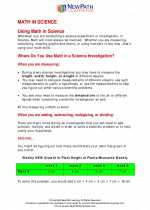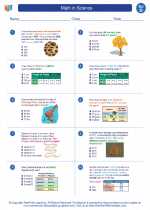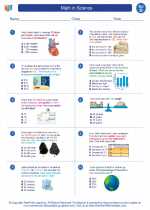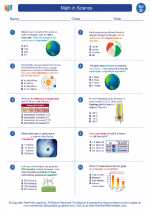Math in Science -> mathematics
Mathematics
Mathematics is the study of numbers, shapes, and patterns. It is an essential subject that helps us understand the world around us and solve problems in various fields such as science, engineering, economics, and more.
Key Concepts in Mathematics
- Numbers: Mathematics deals with different types of numbers, including whole numbers, fractions, decimals, and negative numbers.
- Operations: Basic mathematical operations include addition, subtraction, multiplication, and division. These operations are used to perform calculations and solve equations.
- Geometry: Geometry focuses on the study of shapes, sizes, and properties of space. It includes concepts such as points, lines, angles, and solids.
- Algebra: Algebra involves the use of symbols and letters to represent numbers and quantities. It also includes solving equations and working with expressions and functions.
- Measurement: Mathematics is used to quantify and measure objects, time, distance, weight, and other physical quantities.
- Statistics: Statistics involves collecting, analyzing, and interpreting data to make informed decisions and predictions.
Study Guide for Mathematics
- Practice Basic Operations: Work on addition, subtraction, multiplication, and division problems to improve your computational skills.
- Understand Geometry Concepts: Familiarize yourself with geometric shapes, angles, and properties to enhance your spatial reasoning abilities.
- Master Algebraic Techniques: Practice solving equations, simplifying expressions, and understanding the rules of algebraic manipulation.
- Explore Measurement Units: Learn about different units of measurement and how to convert between them to solve real-world problems.
- Engage with Data and Statistics: Interpret graphs, tables, and charts to understand and analyze data sets.
- Apply Mathematics in Daily Life: Look for opportunities to apply mathematical concepts in everyday situations, such as calculating grocery expenses or measuring ingredients for a recipe.
[Mathematics] Related Worksheets and Study Guides:
.◂Science Worksheets and Study Guides Fourth Grade. Math in Science
Study Guide Math in Science - 4th grade
Math in Science - 4th grade  Worksheet/Answer key
Worksheet/Answer key Math in Science - 4th grade
Math in Science - 4th grade  Worksheet/Answer key
Worksheet/Answer key Math in Science - 4th grade
Math in Science - 4th grade  Worksheet/Answer key
Worksheet/Answer key Math in Science - 4th grade
Math in Science - 4th grade 

 Worksheet/Answer key
Worksheet/Answer key
 Worksheet/Answer key
Worksheet/Answer key
 Worksheet/Answer key
Worksheet/Answer key

The resources above cover the following skills:
Science as Inquiry and Process (SA1, SA2, SA3)
The student develops an understanding of the processes of science by asking questions, predicting, observing, describing, measuring, classifying, making generalizations, inferring and communicating.